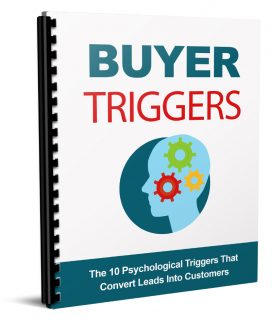 License Type: Master Resell Rights
License Type: Master Resell Rights  File Type: ZIP
File Type: ZIP
 SKU: 60378
SKU: 60378  Shipping: Online Download
Shipping: Online Download
Sample Content Preview
The mind is the root of every action and reaction in our world. What we do physically is merely the manifestation of what’s going on in our mind. Our actions are extensions of our thoughts. Even when our actions seem to go against our thoughts, they are in fact driven by our subconscious compulsions. Every action and reaction can be traced back to the human psyche.
Customers, consumers or clients are no different. People decide under the influence of psychological triggers. These psychological triggers can be influenced by many factors. While there are dozens of elements that can influence the psyche of an individual, here are the ten most important psychological triggers that convert leads into customers.
1. The Quest for Pleasure
Every human being is drawn towards pleasure and is averse to pain. No one wants to suffer and everyone wants to have a good time. This desire to be pleasured drives people to buy specific products. As a company, marketing professional or salesperson, you need to present your product or service in a manner that will help the lead to imagine some form of pleasure. The product or service could be anything, right from a foot massager to more data in a postpaid plan. Affordability will always be a quintessentially influencing factor but the lead will at least be interested in buying or signing up if pleasure is assured. The worst selling products or the duds in any industry are those that exist without offering any substantial pleasure to its intended customers or users.
Now, pleasure is not always physical or emotional or psychological. It varies from person to person. Pleasure needs to be well defined in the context of the product and given the kind of audience you are targeting. Once you identify the exact the form of pleasure your audience wants, strategize your marketing campaign accordingly. It is not necessary for a materialistic product to lack emotional pleasure and an immaterial service to have no physical pleasure. Smart marketers know how to package their product or service and how to convey the message.
2. The Pursuit of New and Original
People love new stuff. It doesn’t matter what the product is. New clothes, new shoes, a new car, a new house, a new phone, a new laptop, a new set of speakers or it could be a new set of wine glasses. Everything new has a special appeal. It helps if the product is also an original, that is to say it is not the run off the mill stuff that is already aplenty in the stores. The pursuit of new and original can be explained using the proven fascination with novelty. Studies have proved that exposure or anticipation of novelty items increases the secretion of dopamine in the human brain. Hence, it is a neurological trigger.
Let us illustrate this reality using two simple examples. Every smartphone maker and automaker in the world keeps releasing new variants of their existing models. Other than the rare instance, there is hardly any significant change or improvement in the subsequent variants. You can consider everything from an iPhone to a Galaxy, a Volkswagen to a Toyota. The existing models are repackaged, some specifications are tweaked, some features are upgraded just marginally and there you have a newly manufactured phone or car. This new original product builds anticipation and is satiating for many people. Had this not existed, people would have turned around and said the phone is two years old or the car is eleven months old. They would look for other phones and cars that have been launched in weeks or a few months leading to their purchase. What’s old is the past and people don’t like delving into the past. Everyone wants a piece of the future.
3. The Quintessential Reason
Every product in the world has multiple features and at least one benefit. Else, the product should not exist. The features and benefits will do their job to capture attention and will trigger some interest in the people but they are not enough to drive the sales. You can talk as much as you want about the benefits or features and yet you may fail to convert a lead into a customer. The reality is simple. The lead is waiting for the quintessential reason. Many marketers and salespeople have been misled to believe that people need many reasons to buy something. It is absolutely not true. Most people don’t even know all the features of products that they have purchased. The average consumer is not that savvy or interested. The average consumer has a lot of stuff on their plate. They need one good reason.
Let us talk about organic food or green tea. Does any average consumer know all the differences between organic food and inorganic food? Does an average consumer know exactly the difference between green tea and what has been called tea for ages? Even those who drink tea everyday don’t know the difference between normal tea and green tea or black tea and yellow tea. People have one good reason to opt for organic food or green tea and that has been enough to promote these two products across the world.
4. What’s the Story?
The consumers are not interested in the story of a company. They don’t want to hear how a product has come into being, definitely not when the product is yet to become a bestseller. The consumers want to hear a story that will trigger their emotions. This is the story that marketers or advertisers must conceive. Many years ago when television was not as popular and technology was not what it is today, Volkswagen came out with an advertisement. It was just an image of identical houses in a nondescript but beautiful suburban neighborhood with lawns and paved driveways. Every house had a van parked outside, which was the Volkswagen station wagon.
The image was captivating for sure but it was the few lines accompanying the image that told a great story. It triggered an intellectual response. Needless to say Volkswagen did have an amazing response. You may be aware of the commercials of the sixties through the eighties and even the nineties. You are certainly aware of the stories various commercials narrate during Super Bowl and other major events. The objective is simple: to trigger an emotional response so there is an immediate connection with the audience.
5. Simplicity
Consumers love sophistry, complex craftsmanship, complicated mechanisms and wondrous technology but they don’t want to deal with those firsthand. They want these elements inside the product which must be simple enough for them to use. Everyone uses a remote transponder key but not many want to know how push button ignition work or what the transponder chip actually is. Any product that appears to be complicated or difficult to use will not influence a lead to become a customer. Every product that is utterly simple to use and has some significant utility will always influence a lead to at least consider buying.
There are products that aren’t simple. It is the job of the marketer or the advertiser to simplify the product or at least the messaging. The use of the product or availing the service, securing the benefits of the features or eventually deriving the pleasure as promised must be simple. If the customer has to make an effort to understand a product or service, if a lead imagines using the product or service to be tiresome or requiring a great deal of labor, then the whole campaign will be a definite failure.
6. Following / Popularity / Brand Value /
Fandom
This can easily be the most important psychological trigger but the reason we mention it at sixth is because a company needs to master the first five to become a brand with a worthwhile following. Popularity of a brand instills credibility. People trust its products or services. Fandom instills a sense of unity. People come together and feel like a part of a larger group. Human beings are wired to find a common reason to unite. This has happened more gloriously in case of all religions. Cultivating a loyal or committed following is necessary for every company to sustain its success.
There is a reason why millions of people around the world line up to grab the latest iPhone. In addition to the pursuit of novelty and the quest for pleasure, it is the sense of being a part of the larger group of iPhone users and the fandom that drives the people to put in the effort, also their money.








